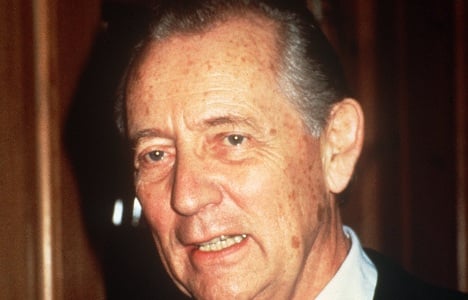As one of his biggest rivals, Der Spiegel publisher Rudolf Augstein, once said, “No other man in Germany, before Hitler or since Hitler, has accumulated so much power, with the exception of Bismarck and the two Kaisers.”
That might be why major politicians queued up on Wednesday to pay tribute to – or condemn – the huge influence that Springer has exerted on Germany’s post-war media landscape, even after his death in 1985.
A number of leading German politicians, business people and celebrities were expected to join celebrations at his publishing house headquarters on Wednesday.
“In Axel Springer, the basic values of the young democracy – freedom, the rule of law, the rejection of any form of totalitarianism, and the social market economy – had a staunch defender,” Chancellor Angela Merkel wrote in an official statement.
Springer was born in Hamburg, starting as an apprentice publisher and compositor at his father’s small publishing house, before working as a journalist for the local Altonaer Nachrichten from 1934.
The foundation for his German media empire was laid after the war, when he published the lifestyle and listings magazine Hörzu in 1946. His first daily newspaper was the Hamburger Abendblatt, followed by his flagship Bild in 1952.
It was this paper, which outstripped the British dailies it was modelled on and now has the world’s biggest newspaper circulation outside Japan, that earned him both the greatest success and the most enemies.
Bild became a focus of animosity during the students’ movement in the 1960s, when critics accused Springer of deliberately steering public opinion against the opposition movement.
Both Springer House buildings and his private homes became the target of bomb and arson attacks. Tensions rose further when student leader Rudi Dutschke was assassinated, and many still believe his killer was incited by Springer’s portrayal of the left-wing activist.
Green Party parliamentarian Hans-Christian Ströbele, veteran of the 1968 movement, told German broadcaster Deutschlandradio on Wednesday that Springer was responsible for making the opposition movement hated throughout the country. “When I think back now, the old anger and outrage rises in me,” he said.
But in paying tribute, Merkel was joined by former US Secretary of State Henry Kissinger, who honoured Springer’s “commitment” to German reunification. Israeli President Shimon Peres also chimed in, saying that Israel saw Springer as a “friend and champion.”
The Local/DAPD/DPA/bk


 Please whitelist us to continue reading.
Please whitelist us to continue reading.
Member comments